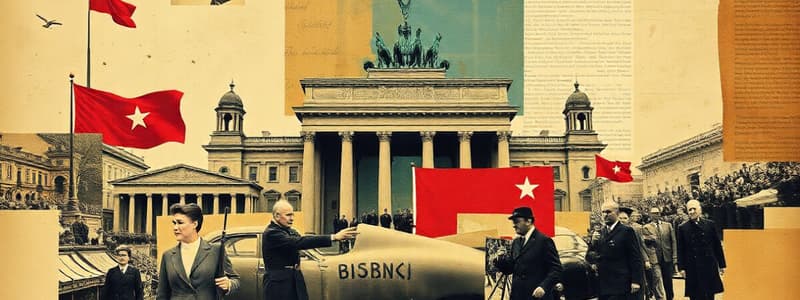Podcast
Questions and Answers
What was the primary intention behind dividing Germany and Berlin into four zones after World War II?
What was the primary intention behind dividing Germany and Berlin into four zones after World War II?
- To facilitate the complete dismantling of German industry and infrastructure.
- To manage Germany's recovery and prevent future conflicts. (correct)
- To create a buffer zone between the Soviet Union and Western Europe.
- To ensure the long-term occupation of Germany by Allied forces.
Which of the following best describes the fundamental ideological conflict that heightened tensions between the United States and the Soviet Union following WWII?
Which of the following best describes the fundamental ideological conflict that heightened tensions between the United States and the Soviet Union following WWII?
- The United States advocating for communism while the Soviet Union promoted capitalism.
- A shared interest in maintaining colonies and expanding imperial power.
- The United States championing capitalism while the Soviet Union adhered to communism. (correct)
- A political split over the distribution of economic resources and post-war wealth.
What action taken by the Soviet Union was seen as a direct threat to world freedom, according to the United States?
What action taken by the Soviet Union was seen as a direct threat to world freedom, according to the United States?
- The Soviet Union's support for democratic revolutions in Eastern Europe.
- The Soviet Union's initiation of trade agreements with nations in South America.
- The Soviet Union's buildup of nuclear weapons in Eastern Germany.
- The Soviet Union’s decision to stop all incoming and outgoing communication in Western Berlin. (correct)
What was the ultimate outcome of the Berlin Crisis, specifically regarding the divide within the city?
What was the ultimate outcome of the Berlin Crisis, specifically regarding the divide within the city?
How did the Soviet Union interpret the United States' presence in Europe after World War II?
How did the Soviet Union interpret the United States' presence in Europe after World War II?
What is a 'proxy war' as it relates to the Cold War?
What is a 'proxy war' as it relates to the Cold War?
Why did the United States and the Soviet Union engage in proxy wars during the Cold War?
Why did the United States and the Soviet Union engage in proxy wars during the Cold War?
What symbolic event is considered the end of the communist control of the Soviet Union during the Cold War era?
What symbolic event is considered the end of the communist control of the Soviet Union during the Cold War era?
What was a primary goal of the United States' involvement in the Korean War?
What was a primary goal of the United States' involvement in the Korean War?
Which of the following best describes the outcome of the Vietnam War?
Which of the following best describes the outcome of the Vietnam War?
What was the main reason behind the Cuban Missile Crisis?
What was the main reason behind the Cuban Missile Crisis?
What action did President Kennedy take in response to the discovery of Soviet missiles in Cuba?
What action did President Kennedy take in response to the discovery of Soviet missiles in Cuba?
Which of these countries had control of Vietnam at some point during the early 20th century?
Which of these countries had control of Vietnam at some point during the early 20th century?
Which conflict was not officially declared a war by the U.S. Congress?
Which conflict was not officially declared a war by the U.S. Congress?
What was the main purpose of the direct phone line established between the USA and the Soviet Union after the Cuban Missile Crisis?
What was the main purpose of the direct phone line established between the USA and the Soviet Union after the Cuban Missile Crisis?
Which statement is most accurate regarding the end of the Cold war?
Which statement is most accurate regarding the end of the Cold war?
What event directly preceded the United States' increased involvement in the Vietnam War?
What event directly preceded the United States' increased involvement in the Vietnam War?
What did President Richard M Nixon do towards the end of the Vietnam War?
What did President Richard M Nixon do towards the end of the Vietnam War?
What was a key contributing factor to the weakening of the Soviet Union that ultimately led to its collapse?
What was a key contributing factor to the weakening of the Soviet Union that ultimately led to its collapse?
Which phrase accurately reflects the strategic doctrine of Mutually Assured Destruction during the Cold War?
Which phrase accurately reflects the strategic doctrine of Mutually Assured Destruction during the Cold War?
What was the main objective that guided the United States' actions during the Cold War?
What was the main objective that guided the United States' actions during the Cold War?
What was the primary characteristic of the Détente period in the Cold War?
What was the primary characteristic of the Détente period in the Cold War?
How did the Soviet Union's initial approach to international affairs at the start of the Cold War period differ from that of the United States?
How did the Soviet Union's initial approach to international affairs at the start of the Cold War period differ from that of the United States?
Which factor was most influential in preventing direct military conflict between the United States and the Soviet Union during the Cold War?
Which factor was most influential in preventing direct military conflict between the United States and the Soviet Union during the Cold War?
How did the Marshall Plan primarily aim to counter the spread of communism in post-World War II Europe?
How did the Marshall Plan primarily aim to counter the spread of communism in post-World War II Europe?
What was a significant consequence of the Soviet Union's desire for a buffer zone in Eastern Europe after World War II?
What was a significant consequence of the Soviet Union's desire for a buffer zone in Eastern Europe after World War II?
What core element of the Cold War was most vividly demonstrated during the Space Race?
What core element of the Cold War was most vividly demonstrated during the Space Race?
The Truman Doctrine is best characterized as:
The Truman Doctrine is best characterized as:
Which event during the Cold War brought the world closest to the brink of nuclear war?
Which event during the Cold War brought the world closest to the brink of nuclear war?
What was the primary goal behind the Soviet's attempt to blockade West Berlin?
What was the primary goal behind the Soviet's attempt to blockade West Berlin?
The Korean War is best described as:
The Korean War is best described as:
Flashcards
Post-WWII Division of Germany and Berlin
Post-WWII Division of Germany and Berlin
The division of Germany and Berlin into four zones, controlled by the US, USSR, Great Britain, and France, after World War II.
US and Soviet Union Post-WWII Goals
US and Soviet Union Post-WWII Goals
The US's desire to rebuild Germany to prevent a third World War, while the Soviet Union aimed to punish Germany for its past actions.
Soviet Union's Perception of US Presence in Europe
Soviet Union's Perception of US Presence in Europe
The Soviet Union's view of the US presence in Europe as an attempt to control and influence European nations, mirroring Hitler's pre-WWII actions.
Clash of Ideologies: Capitalism vs. Communism
Clash of Ideologies: Capitalism vs. Communism
Signup and view all the flashcards
The Berlin Blockade (1948-1949)
The Berlin Blockade (1948-1949)
Signup and view all the flashcards
The Berlin Wall (1961-1989)
The Berlin Wall (1961-1989)
Signup and view all the flashcards
Fall of the Berlin Wall (1989)
Fall of the Berlin Wall (1989)
Signup and view all the flashcards
Proxy Wars (During the Cold War)
Proxy Wars (During the Cold War)
Signup and view all the flashcards
Proxy War
Proxy War
Signup and view all the flashcards
Korean War
Korean War
Signup and view all the flashcards
Spread of Communism
Spread of Communism
Signup and view all the flashcards
Containment of Communism
Containment of Communism
Signup and view all the flashcards
Viet Cong
Viet Cong
Signup and view all the flashcards
Cuban Missile Crisis
Cuban Missile Crisis
Signup and view all the flashcards
Vietnam War Peace Agreement
Vietnam War Peace Agreement
Signup and view all the flashcards
Fall of Saigon
Fall of Saigon
Signup and view all the flashcards
Cold War
Cold War
Signup and view all the flashcards
End of the Cold War
End of the Cold War
Signup and view all the flashcards
What was the Cold War?
What was the Cold War?
Signup and view all the flashcards
What was the Truman Doctrine?
What was the Truman Doctrine?
Signup and view all the flashcards
What was the Marshall Plan?
What was the Marshall Plan?
Signup and view all the flashcards
What was the Berlin Blockade and Airlift?
What was the Berlin Blockade and Airlift?
Signup and view all the flashcards
What was the Korean War?
What was the Korean War?
Signup and view all the flashcards
What was the Space Race?
What was the Space Race?
Signup and view all the flashcards
What was the Cuban Missile Crisis?
What was the Cuban Missile Crisis?
Signup and view all the flashcards
What were the key ideologies of the Cold War?
What were the key ideologies of the Cold War?
Signup and view all the flashcards
Arms Race
Arms Race
Signup and view all the flashcards
Mutually Assured Destruction (MAD)
Mutually Assured Destruction (MAD)
Signup and view all the flashcards
Détente
Détente
Signup and view all the flashcards
Collapse of the Soviet Union
Collapse of the Soviet Union
Signup and view all the flashcards
Study Notes
Berlin Crisis (1958-1961)
- Post-WWII, Germany and Berlin divided into four zones (US, USSR, UK, France).
- US and USSR had differing views on German reconstruction (US for rebuilding, USSR for punishment).
- USSR opposed US presence in Europe, viewing it as power-grabbing.
- Ideological conflict (Capitalism vs. Communism) further exacerbated tensions.
- USSR blocked all communication with Western Berlin, aimed at isolating the city.
- Attempts at negotiation failed, escalating with the construction of the Berlin Wall.
- The Berlin Wall symbolized the ideological divide, culminating in its fall in 1989, reuniting the city.
Containment in Action (Proxy Wars)
- Cold War characterized by proxy wars (neither superpower directly confronting each other).
- Korean War (1950-1953): Korea divided (North – USSR, South – US).
- USSR promoted communism in North Korea.
- US attempted to contain communism in South Korea (financial and military aid).
- US suffered 36,000 casualties in supporting South Korea.
- Vietnam War (1957-1975): Vietnam divided (North – Communist, South – Anti-Communist).
- US supported South Vietnam to contain communism.
- North Vietnam (supported by USSR and China) fought South Vietnam.
- US involvement expanded to neighboring countries (Cambodia & Laos).
- US lost over 55,000 troops.
- War ended with North Vietnam gaining control of the entire country in 1975.
- Proxy wars included many smaller conflicts, fought in regions across the globe.
Cuban Missile Crisis (1962)
- Cuba became a communist state under Fidel Castro.
- Cuba allowed USSR to place nuclear missiles pointed at the US.
- Missiles could reach Washington D.C., a direct threat to the US.
- US discovered missiles through spy plane reconnaissance.
- US imposed a naval blockade around Cuba, a crucial step in de-escalation.
- Risk of nuclear war averted through a last-minute agreement, showcasing the dangerous brinkmanship.
- Established a direct hotline between US & USSR to prevent future escalation.
End of the Cold War
- The Cold War ended in December 1991.
- The high cost of the Cold War (resources, time, human lives) led to the decline of communist control.
- The collapse of the Soviet Union and the Eastern Bloc significantly altered the world order.
Defining the Cold War
- A period of geopolitical tension between the US and the USSR and their allies, lasting from the mid-1940s to the early 1990s.
- Characterized by ideological conflict (democracy vs. communism), proxy wars, nuclear arms races, and espionage.
- "Cold" signifies no large-scale direct military conflict between the superpowers.
Origins of the Cold War
- Seeds of conflict sown before WWII's end, rooted in ideological differences (US democracy vs. Soviet communism).
- Mistrust and suspicion grew after wartime cooperation unraveled due to differing post-war agendas in Europe.
- Soviet desire for a buffer zone in Eastern Europe and US vision for a democratic Europe fueled tensions.
- Post-war Soviet expansionism worried the US and its allies, leading to the Truman Doctrine and Marshall Plan.
Key Events and Tensions
- The Truman Doctrine (1947): Pledged US support for countries resisting communist influence, marking a shift in US foreign policy.
- The Marshall Plan (1948): Provided massive economic aid to rebuild Western Europe, aiming to prevent communism spread via economic stability.
- The Berlin Blockade (1948-1949): Soviet attempt to isolate West Berlin, countered by the Berlin Airlift.
- The Korean War (1950-1953): Proxy war between communist North Korea and democratic South Korea, with involvement from the US and Soviet Union's allies.
- The Space Race (1957-1975): Competition in space exploration, showcasing the technological and ideological rivalry between US and USSR. The launch of Sputnik was a pivotal moment.
- The Cuban Missile Crisis (1962): A 13-day standoff over Soviet nuclear missiles in Cuba, almost leading to nuclear war.
Key Ideologies and Actors
- Communism: Soviet Union and Eastern Bloc countries favored a centrally planned economy and single-party rule.
- Democracy: United States and its allies emphasized democratic values, private enterprise, and individual liberties.
- The Soviet Union: Initially aimed to expand communism and create a buffer zone, leading to the establishment of satellite states in Eastern Europe.
- The United States: Sought to contain communist expansion, promoting democracy and capitalism globally.
Arms Race and Deterrence
- Both superpowers accumulated nuclear weapons, creating a dangerous arms race.
- Mutually Assured Destruction (MAD) was a doctrine of deterrence during the Cold War, preventing large-scale war using nuclear weapons.
- The constant threat of nuclear annihilation shaped global politics.
Détente
- A period of reduced tension and increased diplomacy in the 1970s.
- Arms control agreements like SALT were signed, reflecting a desire to manage the nuclear threat.
- This period showed a more stable, albeit adversarial, relationship.
The Collapse of the Soviet Union
- Weakening Soviet economy and internal dissent, compounded by the systemic flaws within the communist system, played major roles in collapse.
- The fall of the Berlin Wall in 1989 was a pivotal event.
- The dissolution of the Soviet Union in 1991 marked the end of the Cold War.
- The collapse dramatically reshaped the global political landscape.
Studying That Suits You
Use AI to generate personalized quizzes and flashcards to suit your learning preferences.




